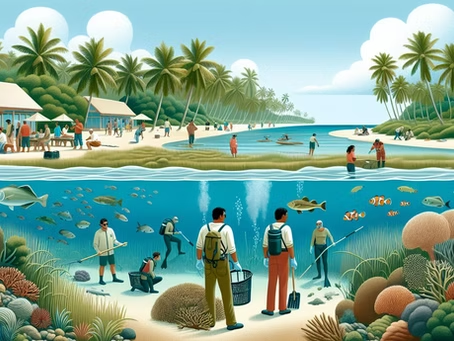Introduction
Marine conservation is a shared responsibility that requires the active participation of local communities, policymakers, scientists, and educators. By embracing community-based approaches, conservation efforts can become more inclusive, sustainable, and effective. This article explores how engaging local stakeholders through capacity-building, sustainable fishing, eco-friendly tourism, and education can strengthen the stewardship of marine environments while fostering cultural and economic resilience.
Key Takeaways
- Community-led initiatives build capacity and promote collaborative marine protected areas.
- Sustainable fishing practices thrive when locals are engaged in decision-making and enforcement.
- Eco-friendly tourism supports both coral reef conservation and community livelihoods.
- Youth engagement through education and citizen science inspires future conservation leaders.
- Integrating science, culture, and governance ensures long-term reef resilience and sustainability.
Diving Into Community Engagement
Building Local Capacity
Capacity-building workshops and training programs equip communities with the knowledge and tools to safeguard marine ecosystems. By involving locals in decision-making, offering alternative livelihoods, and encouraging sustainable practices, communities become empowered custodians of their own marine resources.
Fostering Ownership
When communities manage their reefs, conservation efforts gain longevity. Establishing marine protected areas (MPAs) through participatory processes builds pride, strengthens cultural ties, and ensures that conservation aligns with local needs and traditions.
Creating Partnerships
Effective MPAs are rooted in partnerships among communities, researchers, and conservation groups. These collaborations integrate local knowledge with scientific expertise, strengthening both stewardship and sustainable tourism opportunities.
Fishing for a Sustainable Future
Promoting Sustainable Fishing
- Educating fishers on overfishing and sustainable gear use.
- Introducing practices that minimize bycatch and habitat damage.
- Implementing science-based catch limits.
- Encouraging diverse diets to ease pressure on popular fish stocks.
These steps safeguard marine life while supporting long-term community livelihoods.
Collaborative Management
Shared management of resources ensures communities, fishers, and scientists work together to design and enforce conservation strategies, creating a balanced approach that benefits both ecosystems and economies.
Enforcement Strategies
Community-led enforcement turns residents into guardians of their marine environment. Training and participation in monitoring foster responsibility and accountability, making MPAs more effective and respected.
Riding the Wave of Sustainable Tourism
Eco-friendly Tourism
Responsible tourism strengthens conservation by setting guidelines for diving, reducing pollution, and educating visitors. It provides jobs, enhances education, and supports local economies.
Balancing Growth and Stewardship
Economic prosperity and environmental protection can coexist by valuing ecosystem services and integrating long-term benefits into policy and development planning.
Community Outreach
Tourists become advocates when educated about reef conservation. Outreach programs, workshops, and incentives foster responsible behavior and create a positive ripple effect for marine ecosystems.
Cultivating Young Ocean Guardians
Workshops and Field Trips
Hands-on experiences introduce children to marine ecosystems, inspiring curiosity and long-term stewardship of the ocean.
Citizen Science
Involving students in monitoring reefs fosters real-world learning and cultivates a sense of responsibility toward conservation.
Inspiring the Next Generation
Interactive education and community projects empower young people to become tomorrow’s marine advocates and leaders.
The Ripple Effect of Public Awareness
Highlighting Reef Interconnectivity
Coral reefs are biodiversity hubs that protect coastlines, nurture fisheries, and support tourism. Public campaigns emphasize their role in global and community well-being.
Campaigns for Food Security
Awareness initiatives highlight reefs’ role in food security, storm protection, and economic stability, motivating communities to act collectively.
Economic Benefits of Conservation
Reefs generate income through fisheries, tourism, and natural protection. Understanding these economic values encourages stronger local stewardship.
Navigating the Tides of Coral Reef Conservation
Science and Community Synergy
Blending scientific research with traditional knowledge strengthens reef management and ensures conservation strategies are both effective and culturally relevant.
Innovative Restoration
Techniques such as coral gardening and microfragmentation accelerate reef recovery and build resilience against climate stressors.
Building Reef Resilience
Combining community-led initiatives, sustainable tourism, and local stewardship fosters ecosystems that can adapt and thrive.
Charting New Waters in Policy and Governance
Inclusive Decision-Making
Open forums and representation from all stakeholders ensure equitable conservation policies that reflect community needs.
Policy Supporting Livelihoods
Policies must protect both ecosystems and economic well-being, integrating local voices and sustainable practices into decision-making frameworks.
Strengthening Governance
Transparent rules, accountability, and shared responsibility build trust and reinforce marine conservation efforts at every level.
Anchoring Conservation with Cultural Values
Respecting Indigenous Knowledge
Indigenous practices offer time-tested insights that, when integrated with science, enrich conservation approaches.
Cultural Events for Education
Festivals and gatherings provide opportunities to combine heritage and marine education, strengthening both cultural identity and conservation awareness.
Blending Traditional and Modern Practices
Synergizing traditional knowledge with modern science ensures both cultural continuity and ecological sustainability.
Conclusion
The future of marine conservation lies in communities. By combining capacity-building, sustainable fishing, eco-friendly tourism, education, and cultural respect, we can foster resilient ecosystems and sustainable livelihoods. Together, communities and conservationists can chart a path toward a thriving ocean and a more sustainable planet.
Frequently Asked Questions
- What are community-based initiatives? They include workshops, training, and marine protected areas led with local participation.
- Why is collaborative management important? It ensures shared responsibility, sustainable fishing, and successful marine protection.
- How does community outreach help? It promotes sustainable practices and unites stakeholders in reef conservation.
- What role does education play? Interactive programs engage students in conservation and inspire future leaders.
- Why engage youth? Young people become tomorrow’s advocates by learning stewardship early.
- How does sustainable tourism contribute? It balances economic growth with conservation and community empowerment.
- What is a comprehensive conservation approach? It combines MPAs, education, research, and tourism for lasting protection.
- Why are awareness campaigns important? They show how reefs support food security, coastal protection, and economies.

